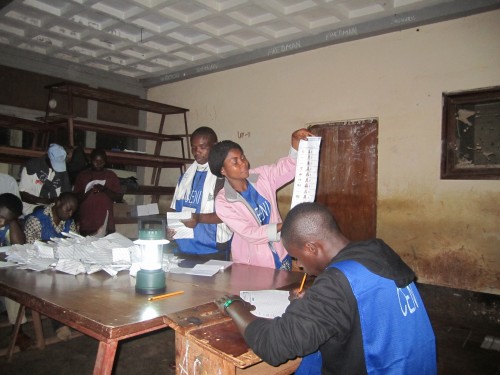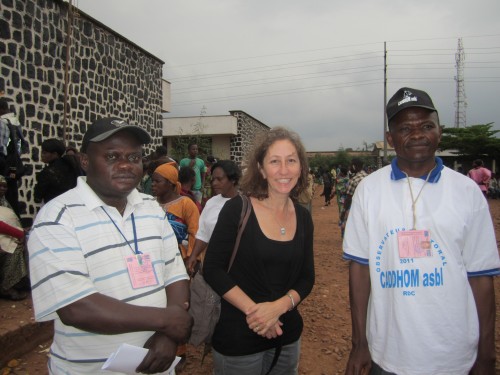[Guest post by Galya Ruffer, J.D., Ph.D., Director, Center for Forced Migration Studies at the Buffet Center, Northwestern University, Evanston, IL. Galya lead a team deployment for the recent Democratic Republic of Congo.]
On November 28th, 2011 crowds assembled at 62,000 polling stations to elect DR Congo’s fifth president in the country’s first independently administered presidential elections since independence in 1960. [caption id="attachment_6669" align="aligncenter" width="500" caption="Polling Station in Bukavu, Ibanda Commune"] [/caption]Getting off to a late start, just three months before the elections, Center for Forced Migration Studies at Northwestern University (CFMS) organized a group of voluntary partners comprised of humanitarian, civil society and human rights organizations to report on the elections. With Ushahidi’s past record of difficulty deploying to the Congo given it’s size (as large as Western Europe), lack of infrastructure and limited electricity and access to technology, the late start and lack of funds posed a major challenge. Therefore, our first decision was to limit the deployment to focus on the hotbed areas for violence: North and South Kivu in the east and the main opposition candidate’s stronghold, Kinshasa.
Technology had improved considerably since 2006 with most people having cell phones and greater access to wireless. On the other hand, the remote areas most sensitive to violence and election fraud are the ones without cell service and electricity. Thus, many of the same challenges remained. Knowing all these challenges, we still decided that deployment would be useful since many organizations are looking to crisis mapping to assist in combating the ongoing insecurity in eastern Congo and massive sexual violence. We could all learn from the experience. The site went live one week before the elections, on November 18th, reporting in French and English.
[/caption]Getting off to a late start, just three months before the elections, Center for Forced Migration Studies at Northwestern University (CFMS) organized a group of voluntary partners comprised of humanitarian, civil society and human rights organizations to report on the elections. With Ushahidi’s past record of difficulty deploying to the Congo given it’s size (as large as Western Europe), lack of infrastructure and limited electricity and access to technology, the late start and lack of funds posed a major challenge. Therefore, our first decision was to limit the deployment to focus on the hotbed areas for violence: North and South Kivu in the east and the main opposition candidate’s stronghold, Kinshasa.
Technology had improved considerably since 2006 with most people having cell phones and greater access to wireless. On the other hand, the remote areas most sensitive to violence and election fraud are the ones without cell service and electricity. Thus, many of the same challenges remained. Knowing all these challenges, we still decided that deployment would be useful since many organizations are looking to crisis mapping to assist in combating the ongoing insecurity in eastern Congo and massive sexual violence. We could all learn from the experience. The site went live one week before the elections, on November 18th, reporting in French and English.
 [/caption]
A third dedicated partner was Catholic Agency for Overseas Development (CAFOD), who organized to station a volunteer in Kinshasa to receive reports from the 30,0000 network of Catholic Bishop monitors in the field. Although in contact with the EU monitoring team, there were no actual exchanges of information and the Carter center did not respond to emails.
We provided all partners with training material and produced post card sized printouts with SMS instructions. I only arrived on the ground on November 25th, but used my time there to meet with local partners none of whom, even though they had received all my materials before hand, had actually visited the site. Internet access is simply too complicated to spend time trying to view a site that takes hours to access. On the other hand, once I arrived and installed the local SIM cards, the Android phones with SMSSync worked perfectly. In fact, since I put the SIM cards on roaming, they work even here in Chicago.
[/caption]
A third dedicated partner was Catholic Agency for Overseas Development (CAFOD), who organized to station a volunteer in Kinshasa to receive reports from the 30,0000 network of Catholic Bishop monitors in the field. Although in contact with the EU monitoring team, there were no actual exchanges of information and the Carter center did not respond to emails.
We provided all partners with training material and produced post card sized printouts with SMS instructions. I only arrived on the ground on November 25th, but used my time there to meet with local partners none of whom, even though they had received all my materials before hand, had actually visited the site. Internet access is simply too complicated to spend time trying to view a site that takes hours to access. On the other hand, once I arrived and installed the local SIM cards, the Android phones with SMSSync worked perfectly. In fact, since I put the SIM cards on roaming, they work even here in Chicago.
 [/caption]Getting off to a late start, just three months before the elections, Center for Forced Migration Studies at Northwestern University (CFMS) organized a group of voluntary partners comprised of humanitarian, civil society and human rights organizations to report on the elections. With Ushahidi’s past record of difficulty deploying to the Congo given it’s size (as large as Western Europe), lack of infrastructure and limited electricity and access to technology, the late start and lack of funds posed a major challenge. Therefore, our first decision was to limit the deployment to focus on the hotbed areas for violence: North and South Kivu in the east and the main opposition candidate’s stronghold, Kinshasa.
Technology had improved considerably since 2006 with most people having cell phones and greater access to wireless. On the other hand, the remote areas most sensitive to violence and election fraud are the ones without cell service and electricity. Thus, many of the same challenges remained. Knowing all these challenges, we still decided that deployment would be useful since many organizations are looking to crisis mapping to assist in combating the ongoing insecurity in eastern Congo and massive sexual violence. We could all learn from the experience. The site went live one week before the elections, on November 18th, reporting in French and English.
[/caption]Getting off to a late start, just three months before the elections, Center for Forced Migration Studies at Northwestern University (CFMS) organized a group of voluntary partners comprised of humanitarian, civil society and human rights organizations to report on the elections. With Ushahidi’s past record of difficulty deploying to the Congo given it’s size (as large as Western Europe), lack of infrastructure and limited electricity and access to technology, the late start and lack of funds posed a major challenge. Therefore, our first decision was to limit the deployment to focus on the hotbed areas for violence: North and South Kivu in the east and the main opposition candidate’s stronghold, Kinshasa.
Technology had improved considerably since 2006 with most people having cell phones and greater access to wireless. On the other hand, the remote areas most sensitive to violence and election fraud are the ones without cell service and electricity. Thus, many of the same challenges remained. Knowing all these challenges, we still decided that deployment would be useful since many organizations are looking to crisis mapping to assist in combating the ongoing insecurity in eastern Congo and massive sexual violence. We could all learn from the experience. The site went live one week before the elections, on November 18th, reporting in French and English.
Organizing Networks and Teams
Through the international partners, a U.S. based diaspora group, RDC2XTE, seeking an alternative vision for DRC through supportive actions to improve accountability and advancement, and our own contacts, we created a network of local independent observers and media sources based in Bukavu and Goma in the eastern Congo and Kinshasa to continuously report back what they were witnessing at various polling stations. One of our main dedicated partners in the east, the Institute for War and Peace Reporting, trained and organized local women journalists to SMS or email direct reports. A second dedicated partner, Collectif D'Actions Pour La Defense Des Droits Humains (CADDHOM), a local NGO focusing on a wide range of programs concerning human rights, was an official partner of the CENI (the National Election Commission) deploying 200 monitors in South Kivu. CADDHOM sent us reports via email and SMS as they received phone calls and SMS from their official field observers. I also accompanied the executive director of CADDOM, Pasteur Joseph on election day to observe the elections. [caption id="attachment_6679" align="aligncenter" width="500" caption="Outside EDAP Polling Station in Bukavu with CADDHOM Coordinator, Pasteur Joseph (right) "] [/caption]
A third dedicated partner was Catholic Agency for Overseas Development (CAFOD), who organized to station a volunteer in Kinshasa to receive reports from the 30,0000 network of Catholic Bishop monitors in the field. Although in contact with the EU monitoring team, there were no actual exchanges of information and the Carter center did not respond to emails.
We provided all partners with training material and produced post card sized printouts with SMS instructions. I only arrived on the ground on November 25th, but used my time there to meet with local partners none of whom, even though they had received all my materials before hand, had actually visited the site. Internet access is simply too complicated to spend time trying to view a site that takes hours to access. On the other hand, once I arrived and installed the local SIM cards, the Android phones with SMSSync worked perfectly. In fact, since I put the SIM cards on roaming, they work even here in Chicago.
[/caption]
A third dedicated partner was Catholic Agency for Overseas Development (CAFOD), who organized to station a volunteer in Kinshasa to receive reports from the 30,0000 network of Catholic Bishop monitors in the field. Although in contact with the EU monitoring team, there were no actual exchanges of information and the Carter center did not respond to emails.
We provided all partners with training material and produced post card sized printouts with SMS instructions. I only arrived on the ground on November 25th, but used my time there to meet with local partners none of whom, even though they had received all my materials before hand, had actually visited the site. Internet access is simply too complicated to spend time trying to view a site that takes hours to access. On the other hand, once I arrived and installed the local SIM cards, the Android phones with SMSSync worked perfectly. In fact, since I put the SIM cards on roaming, they work even here in Chicago.